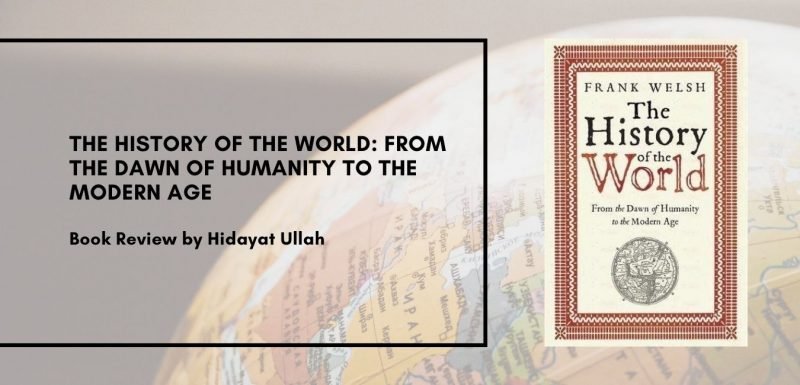[Book Review] The History of the World: From the Dawn of Humanity to the Modern Age

The book “HISTORY OF THE WORLD” is written by “FRANK WELSH”. This book has both positive and negative aspects of it. Keeping in view the subject of History, this book is a tremendous and mesmerizing contribution to well-wishers and passionate people. This is no doubt a meaningful benefaction to the subject of history, as it carries a brief overview of the major events that took place throughout the world. It also gives an absolute idea about human evolution and the great civilizations of the world. It will not be wrong to say that Frank welsh takes the reader to the pre-medieval era and then provides a logical, reasonable and rational knowledge about the modern world.
Although he has had the matter of subjectivity in his work, as in various chapters he has neglected the matter of objectivity and is biased in providing the actual and objective knowledge. He is lacking the matter of objectivity especially when he talks about the eastern world. He is also lacking in having a thorough and rigorous study of the eastern world. He curtails the magnificent empires, political institutions, emperors and their achievements. Another negative aspect of his work is that he targets the religious beliefs of a particular community.
For example, he has lacerated the religious beliefs and sacred places of the Muslims. The writer only focuses on the western world and more specifically on Europe in his book. No doubt Europe has been through an interminable and tedious journey to reach this destination. But in order to write an unprejudiced and impartial book, ethnicity, religious beliefs, nationality and the level of hatred for others should be kept aside.
To further depict this Book I have selected some strengths and weaknesses of Frank Welsh’s book. The first-ever positive strand of this book is the peculiar and uniqueness in which the book has been written. The title of the book can sum-up my argument flawlessly. This book gives an overarching overview of the world. The readers get a perception about the events, tragedies, and disasters that took place throughout the world. The chronological order in which the events are arranged throughout the book in the shape of chapters is eye-catching.
The reader gets through the work smoothly and finds no hurdles and difficulties in understanding it. For instance: starting from the civilizations (River) and human evolution, mentioning the homoerectus (the upright man) and Homosapien to the early empires and summing all the important segments, movements, wars, treaties, empires, rulers, kings, nations and their policies of tackling their opponent.
Secondly, the way of communicating things to the reader and the vocabulary that has been used is very easy and understandable. This helps the reader to understand things easily and swiftly. For example, Welsh provides an out-and-out and apodictic apprehension of the Early civilizations, Religions, reformation and slavery movements, western, African and eastern world in a very limpid and elementary way. The chapter-wise way of communicating the knowledge helps the reader to grab things rapidly and the reader does not get bored. The terms used throughout the book are kept simple. There is hardly any term that is difficult to understand. It will not be wrong to say that no one can supplant this epic and storytelling masterpiece of Welsh. Moreover, the sayings of different historians, poets, omnipotent kings and their nobles which are quoted in this book gives a sort of imaginary perception about that particular span of time.
Another positive thing about this book is the information that has been given in this book. All the areas are covered stupendously and awe-inspiringly. The reader gets knowledge about almost every important and significant event. This piece of history is a bombardment of knowledge as well as an ideologue for the readers, as it contains information about famines, natural disasters, wars, treaties, kings, nation-building, and many other fruitful lessons.
In my opinion, the negative aspect of this book is that the writer is abandoning partiality in his work, especially when he talks about Islam and the Eastern world. Calling Islam the “Abode of peace” on one hand and curtailing its Excellency, on the other hand, is thick-witted and bizarre. Welsh traces the Shia-Sunni conflict from the battle of Karbala whilst the seeds of this interfaith tussle was rooted after the death of Holy Prophet Muhammad (P.B.U.H).
Furthermore, the bias flutters from the book once the writer talks about the Muslim Empire in Spain. Branding Muslims Barbarians and uncivilized whilst calling the Charles martial a hero is totally biased and prejudiced. The writer has thrown more light on the warfare, political system, and the philosophers of Europe and the western world forsaking the philosophical and scientific thinkers of the Eastern world. For instance, he talks about the Humanist movement, the Enlightenment and the famous philosophers like “Rene Descartes”, Thomas Moore, Voltaire and patriarch, whereas he has totally neglected the famous philosophers and Historians of Eastern world. Personalities like Ibn e Sina known as Avicenna in the west, Al Razi, Farabi, and Historians like Ibn e Battuta, Firdausi, and other great names are not mentioned as all these did a tremendous job in their respective fields. The writer has also neglected the great and autocratic rulers and gigantic empires of the eastern world especially India. For example, when he talks about the Mughal Empire, he totally forsakes the great emperors like Mahmood of Ghazna, Muhammad Ghouri and Akbar the Great. In contrast with European and western world, he does not talk about the political and administrative setup of the eastern world. In the course of the Mughal Empire, he has not talked about the achievements, political order and economic conditions of the empire. This means that the writer is more concerned about the western world. The argument of having subjectivity in this book comes true when one looks at the biased attitude of the writer on the part of the Eastern world. Looking deep into this classical work although biased in some chapters has tapered the whole charisma of the book.
Recommendations
No doubt, this book is an epic and masterpiece of world History, as it covers almost all aspects of every corner of the world. But there are some reservations which need to be clarified on the part of writing a completely unbiased and impartial book. The writer should keep a balance between both the Eastern and Western world. Demographical differences should be erased and there should be complete partiality in the book. Secondly, the writer should focus on the evidence and arguments. Comparison of different events and empires and Analytical approach is lacking in the book, which should be looked upon. In a nutshell, the writer should keep the biases and prejudices aside and write the book maintaining the matter of objectivity.


















